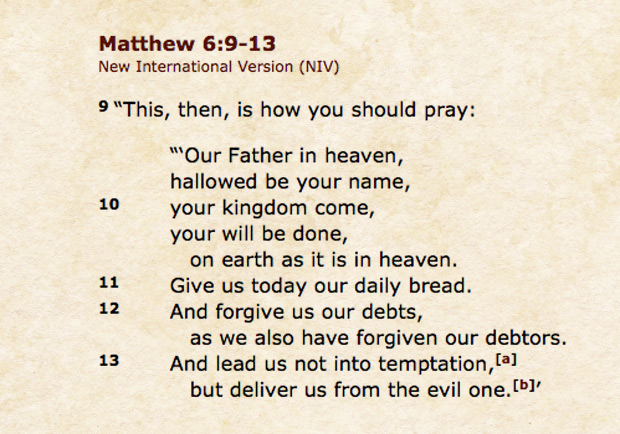In Mullin v. Sussex County, Delaware, a U.S. District Court must answer whether the Lord’s Prayer is sectarian. Four residents sued the county council for opening meetings with the prayer. The county says it’s not Christian “because no Christian tradition existed” when Jesus prayed it. The judge called the case difficult “because there is no reference to Jesus or Allah.” Observers weigh in on whether the Lord’s Prayer is a Christian prayer.
“The Lord’s Prayer is ‘the’ Christian prayer. It comes up more than any other text in Christian liturgies since the first century. And its context in Matthew and Luke gives explicitly Christian meanings to terms such as Father and kingdom.”
Telford Work, author, Ain’t Too Proud to Beg
“It is distinctly Christian. In the New Testament, it is Jesus who gives us the prayer. Throughout the Christian church—whether Catholics, Protestants, or Eastern Orthodox—people pray that prayer. You will not find it in a Jewish synagogue.”
Simon Kistemaker, New Testament professor, Reformed Theological Seminary
“It is a Christian prayer. Jesus was certainly influenced by certain Jewish models of prayer, but he gave it to his disciples specifically. So it’s a direct inheritance for us as Christians.”
Arthur Boers, author, Lord, Teach Us to Pray
“The Lord’s Prayer is both Jewish and Christian. Jesus, a Jew, was teaching his Jewish followers to pray. But the fact that it is a part of both traditions fails to make it sufficiently nonsectarian to pass constitutional muster.”
J. Brent Walker, executive director, Baptist Joint Committee for Religious Liberty
“You could consider it a prayer for multiple religions, because Jesus is considered to be a rabbi or a great teacher by many of the world’s religions. It was not originally delivered as a Christian prayer; it was simply a teacher teaching his disciples a good way to pray.”
Clayton Schmit, professor, Fuller Theological Seminary
“The prayer in and of itself does not explicitly espouse the precepts of Christianity. It recognizes God, but does not proselytize a particular religion. And case law does not support a mandatory total prohibition of prayer at public gatherings.”
Brad Dacus, president, Pacific Justice Institute
Copyright © 2012 Christianity Today. Click for reprint information.
Related Elsewhere:
Previous topics for Under Discussion include mercury pollution and the pro-life fight, the relationship between the same-sex marriage debate and pro-life advocacy, trademarking church names and logos, the liturgical calendar, pastors and marriage for cohabitating couples, church disruptions, politicians and infidelity, politicians and religious persecution, faith healing and legal protection, pastors’ housing allowances, sacred spaces, stinginess, TSA screening, and Christmas carols with questionable theology.
See Christianity Today‘s news section and liveblog for more news updates.










